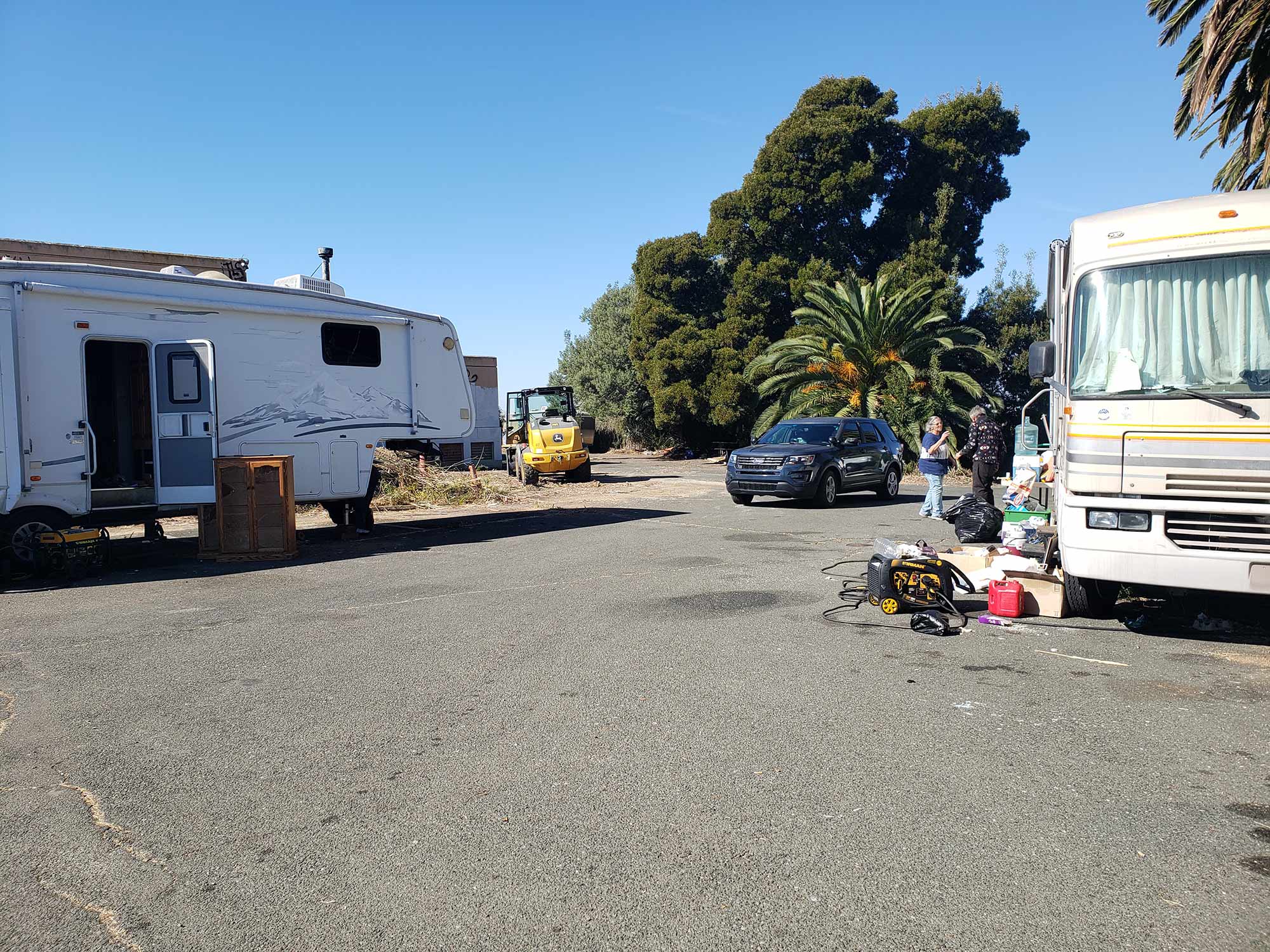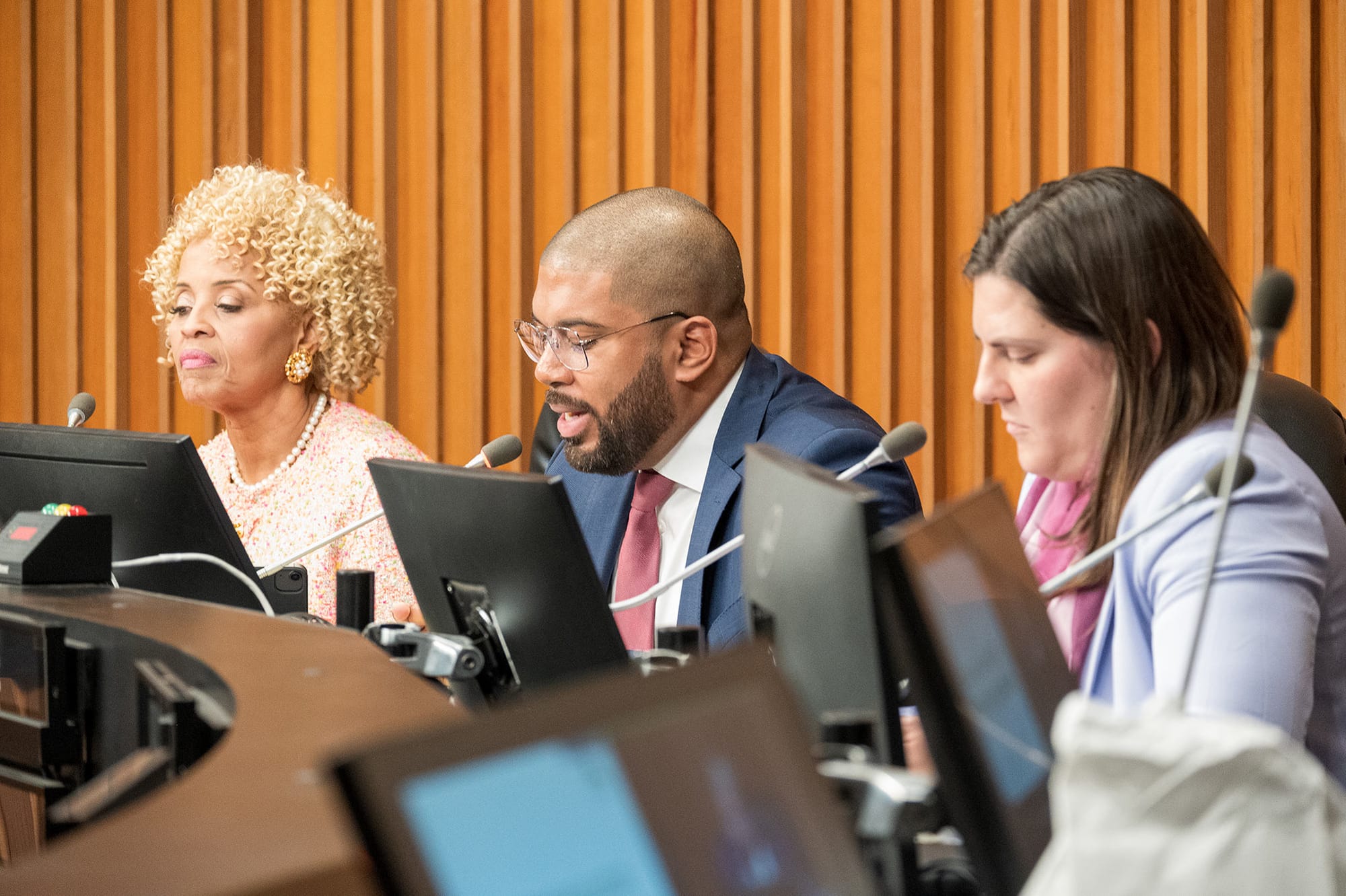VALLEJO – Vallejo city officials and police officers told residents of a Mare Island encampment who sued the city in August that they had to leave the property or their vehicles and RVs would be towed after a federal judge did not grant their request for a temporary restraining order.
City officials arrived at the camp, which is on U.S. Navy land licensed to the city on the north end of Mare Island, at about 8:30 a.m. Wednesday.
A week before Wednesday’s encampment clearing, city officials posted notices stating that vehicles and personal property would be removed and impounded. Assistant to the City Manager Natalie Peterson said that city officials also went out the day before to remind residents that they were coming to clear the camp.
Peterson said that the city would tow abandoned vehicles first to allow residents time to pack and leave the property. But despite the notice, the action caught some residents off guard as the judge had given them leave to amend their lawsuit.
Many residents of the encampment have disabilities and several are seniors. The group initially began camping together because the older residents and those with disabilities needed help with various tasks and working residents needed a community to keep an eye on their belongings while they were away at work.
Encampment resident Michael Mardell had his trailer packed up and ready to leave for Arizona. But he was unable to move it in time so it was impounded by the city. Mardell said that he is now facing hundreds of dollars in fines and storage fees. He said he will have to use his next social security check to pay the fines instead of using it for the trip to Arizona. Mardell and his dog slept in his pick-up truck Wednesday night after his trailer was towed.
City Manager Andrew Murray said in a statement on Thursday that the city intended to move forward with encampment removals in light of the judge’s ruling even though the city does not anticipate that its long-delayed navigation center and supportive housing project on Broadway will open before the winter.
The encampment residents filed a federal lawsuit on their own behalf on Aug. 30 alleging that the city’s frequent encampment clearings and impounding vehicles posed a threat to their safety and constituted an improper seizure of property in violation of their civil rights.
The lawsuit names city officials, the Vallejo police department and Caltrans as defendants and describes the plaintiffs’ experiences of being forced to leave one location after another under the threat of losing their vehicle or RV, which is their only form of shelter.
They argued that the city’s planned eviction would violate their 14th Amendment protections against state created danger because the action would break up their community making them vulnerable to violent crime or theft and if their vehicles and RVs are impounded they will be exposed to the elements. The group also alleged that the city had violated protections under the Americans with Disabilities Act.
Similar arguments under the state created danger doctrine have previously been combined with claims related to 8th Amendment protections against cruel and unusual punishment to prevent encampment closures in the western U.S. But in June the U.S. Supreme Court ruled that enforcement of camping bans does not violate the 8th Amendment.
The residents’ lawsuit detailed some of the group’s previous experience with law enforcement at the camp. On Aug. 26, the lawsuit states that when Peterson first spoke with residents and told them to leave the property she was accompanied by eight officers who arrived with her in four patrol cars.
Lawsuit filings also described an alleged incident on Sept. 17 when Solano County Sheriff’s Deputy Dale Matsuoaka and city officials arrived at the camp to post eviction notices and Matsuoaka held a shotgun “by the pistol grip in ready position throughout the duration of the visit to the camp.”

In a response opposing the group’s motion for a temporary restraining order, the city of Vallejo included a letter from Navy base closure manager Charles Perry stating that the Navy had received a report of individuals trespassing and parking vehicles and trailers on the property.
In the letter, Perry wrote, “Based on photographs provided, the trespassers are storing fuel and are at risk to Navy and City property.” Perry noted that the city, as licensee, is required to protect, maintain and keep the premises under its control in good working order at its own cost and expense.
The city argued that they have responsibility to maintain the property under their agreement with the Navy and that the state created danger doctrine does not apply because the encampment residents will not face any adverse actions from the city if they leave the property as requested.
The city also argued that they had not violated protections under the Americans with Disabilities Act because they had postponed the eviction action when they received a request from the residents for disability accommodation.
On Oct. 7, U.S. Magistrate Judge Chi Soo Kim declined to grant the restraining order because the plaintiffs had not clearly stated how the defendants had violated the constitutional protections identified in the complaint. The ruling also noted several other procedural deficiencies which prevented the court from granting the restraining order.
The judge recommended dismissal of the case but allowed plaintiffs’ the opportunity to correct the deficiencies in the complaint and refile it within 30 days.
Many of the residents were unprepared for the encampment removal because they thought that the city would not clear their camp until they were able to amend their complaint.
Shawn O’Mally, who is plaintiff in the lawsuit, said, “We may win because of the city’s actions today, the court gave us 30 days to refile our case.”
Although residents said that they feel angry and frustrated by the city’s actions and they plan to move forward with the lawsuit, some also said that the Vallejo Police officers who were present for the clearing were respectful and took time to talk with them in an empathetic manner.
One resident of the encampment said that the repeated evictions the group has faced are stressful and make it more difficult to manage her work schedule at her new job. She said that her and her husband are both employed and they are saving up to rent an apartment or a house. They ended up hiring tow company to move their RV because it would not start once they were all packed up.
That night the couple slept in their RV while parked in front of the towing company’s yard.
Some residents were able to stay together but others had to take whatever spots they could find in various locations throughout the city.
“We are kind of splintered right now,” encampment member Robert Toepfer said. “We do want to reconvene, but there are just not a lot of places where thirteen or fourteen people can camp together.”
Before you go...
It’s expensive to produce the kind of high-quality journalism we do at the Vallejo Sun. And we rely on reader support so we can keep publishing.
If you enjoy our regular beat reporting, in-depth investigations, and deep-dive podcast episodes, chip in so we can keep doing this work and bringing you the journalism you rely on.
Click here to become a sustaining member of our newsroom.
THE VALLEJO SUN NEWSLETTER
Investigative reporting, regular updates, events and more
- Housing
- homelessness
- government
- policing
- Vallejo
- Natalie Peterson
- Michael Mardell
- Andrew Murray
- Dale Matsuoka
- Charles Perry
- U.S. Navy
- Chi Soo Kim
- Shawn O'Mally
- Robert Toepfer

Ryan Geller
Ryan Geller writes about transitions in food, health, housing, environment, and agriculture. He covers City Hall for the Vallejo Sun.
follow me :




